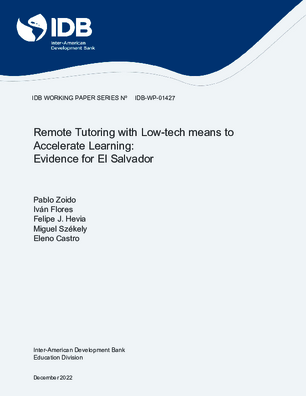Remote Tutoring with Low-tech Means to Accelerate Learning: Evidence for El Salvador
Date
Dec 2022
This paper presents the results of an impact evaluation, with an experimental design, which estimates the effect on learning math of a remote tutoring program offered to girls and boys aged 9-14 years in three departments of El Salvador. The program used low-tech interventions such as text messages and 20-minute phone calls over an eight-week period. Remote tutoring is estimated to have had a positive and significant effect of 0.23 standard deviations, which is equivalent to a 33.2 percent acceleration in learning math, compared to the changes observed in the control group. Evidence shows that the rate of learning increases considerably as the number of tutoring sessions taken increases. When compared with other related studies, we conclude that the intervention is cost-effective. The main innovative elements are: (i) the generation of evidence through instruments applied in person, which ensures high quality and accuracy in learning level measurements; (ii) to our knowledge, this is the first experimental evaluation program of its kind in Latin America implemented during the pandemic, with schools partially open, which allows us to verify whether the intervention is as effective as similar such interventions in other contexts and regions of the world; (iii) the use of two types of learning level tests to validate the robustness of the results.




